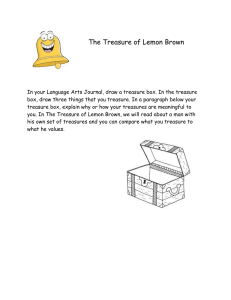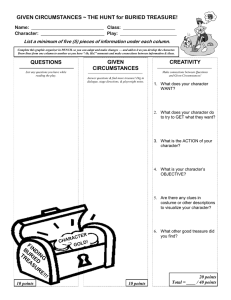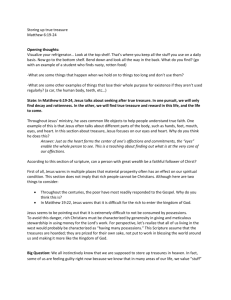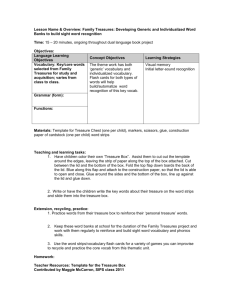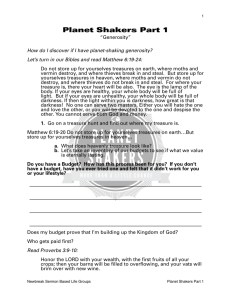Document 14396649
advertisement
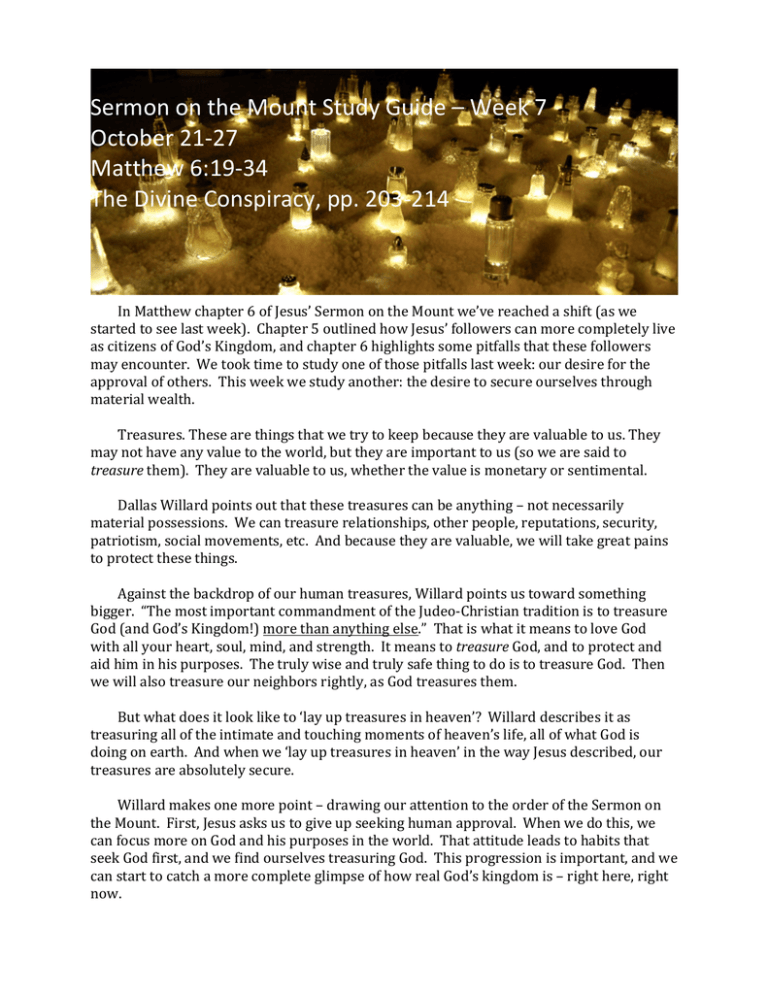
Sermon on the Mount Study Guide – Week 7 October 21-­‐27 Matthew 6:19-­‐34 The Divine Conspiracy, pp. 203-­‐214 In Matthew chapter 6 of Jesus’ Sermon on the Mount we’ve reached a shift (as we started to see last week). Chapter 5 outlined how Jesus’ followers can more completely live as citizens of God’s Kingdom, and chapter 6 highlights some pitfalls that these followers may encounter. We took time to study one of those pitfalls last week: our desire for the approval of others. This week we study another: the desire to secure ourselves through material wealth. Treasures. These are things that we try to keep because they are valuable to us. They may not have any value to the world, but they are important to us (so we are said to treasure them). They are valuable to us, whether the value is monetary or sentimental. Dallas Willard points out that these treasures can be anything – not necessarily material possessions. We can treasure relationships, other people, reputations, security, patriotism, social movements, etc. And because they are valuable, we will take great pains to protect these things. Against the backdrop of our human treasures, Willard points us toward something bigger. “The most important commandment of the Judeo-­‐Christian tradition is to treasure God (and God’s Kingdom!) more than anything else.” That is what it means to love God with all your heart, soul, mind, and strength. It means to treasure God, and to protect and aid him in his purposes. The truly wise and truly safe thing to do is to treasure God. Then we will also treasure our neighbors rightly, as God treasures them. But what does it look like to ‘lay up treasures in heaven’? Willard describes it as treasuring all of the intimate and touching moments of heaven’s life, all of what God is doing on earth. And when we ‘lay up treasures in heaven’ in the way Jesus described, our treasures are absolutely secure. Willard makes one more point – drawing our attention to the order of the Sermon on the Mount. First, Jesus asks us to give up seeking human approval. When we do this, we can focus more on God and his purposes in the world. That attitude leads to habits that seek God first, and we find ourselves treasuring God. This progression is important, and we can start to catch a more complete glimpse of how real God’s kingdom is – right here, right now. Discussing the Text: 1. Verses 19-­‐21 remind us that our hearts stay with the things that we treasure, so value the things of utmost importance – value the treasures of heaven. a. How do you value the treasures of heaven as a group or community? b. Talk about what it looks like to value the treasures of heaven as an individual. 2. The Aramaic term translated as “Money” in verse 24 seems to come from a word meaning something along the lines of “something in which one trusts.” a. How does this affect our understanding of what Jesus is saying in this verse? b. Discuss the good and bad of putting trust in our wealth. c. Talk about how a dependence on money affects our trust in God. Discussing the World: 1. When we don’t treasure the things that the rest of the world does, we stand out to the world in ways that aren’t always comfortable or easy. But Jesus didn’t say it would be comfortable or easy – he said the church would most likely face hardships. This is something that we don’t often remember in the Western world. a. Take time to identify what you treasure. Name them (or write them down for yourself) and ask yourself why you treasure those things. 2. Matthew 6:19-­‐34 is a text that has been used to argue that the poor of this world shouldn’t worry. Because to worry about their condition or try to change it would mean that they don’t trust God. a. Talk about your responses to such a reading of this passage. b. Does that understanding seem to catch the focus of Jesus’ words here? Action: Consider the Spiritual Discipline of Simplicity. • The main focus and desire of Simplicity is to un-­‐complicate and untangle your life so that you can focus on what really matters. • Practice speaking simply and with few words. No double-­‐meanings or half-­‐truths • Become aware of when you rationalize, spin, deny, or blame. • If someone admires something of yours, give it away.
